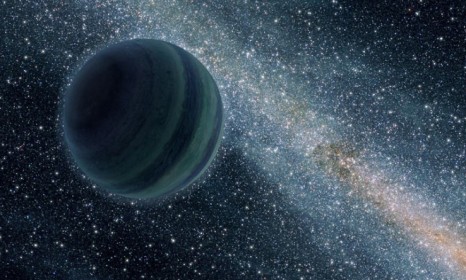The galaxy's 'rogue' planets: Could they hit Earth?
Astronomers have found planets that float freely in space, unencumbered by any star's gravity — and there may be hundreds of billions of them in our galaxy

A free daily email with the biggest news stories of the day – and the best features from TheWeek.com
You are now subscribed
Your newsletter sign-up was successful
Astronomers have found a new class of planets that float freely in space, without being affected by the gravitational pull of any star. Scientists have spotted 10 of these "rogue" planets, each about the size of Jupiter, but suggest there are many more that we can't yet see. Here, a brief guide to the new findings:
How did scientists find these planets?
Normally, scientists discover new planets by focusing on individual stars, and watching for wobbling and small blips of light caused by orbiting planets. But to find planets that aren't attached to a single star, scientists took a few steps back, and looked for changes to light patterns on a broader field of stars much farther away. They focused on an area near the center of the Milky Way, and took pictures every 10 to 50 minutes over several months in 2006 and 2007, amassing a "fearsome" amount of data, says Phil Plait at Discover. They found evidence of up to 10 "orphan" planets without parent stars, just in this one small area of the galaxy.
The Week
Escape your echo chamber. Get the facts behind the news, plus analysis from multiple perspectives.

Sign up for The Week's Free Newsletters
From our morning news briefing to a weekly Good News Newsletter, get the best of The Week delivered directly to your inbox.
From our morning news briefing to a weekly Good News Newsletter, get the best of The Week delivered directly to your inbox.
How many orphan planets are out there?
Based on this small sample, there are hundreds of billions in our galaxy alone. These planets may actually outnumber "regular" planets, and may be twice as common as stars, say the scientists, led by Takahiro Sumi from Osaka University in Japan, in the journal Nature.
Where did the planets come from?
Scientists believe these "lone worlds were probably ejected from developing planetary systems," according to NASA. It may be that other, bigger planets ejected them from orbit when they crossed gravitational paths. "This strongly implies that for every 'hot super-Jupiter' we see, there is one or more planet that got kicked out of the system, sent out into the galaxy at large," says Plait at Discover.
A free daily email with the biggest news stories of the day – and the best features from TheWeek.com
How big a surprise is this discovery?
Scientists had predicted that such free-floating planets would exist, but actually spotting them is startling. "Just when you think the universe is running low on surprises, it reminds us it's a lot more clever than we are," says PlaittDiscover.
Could these free-floating planets hit Earth?
In a word, no. "Without a star to circle, these planets would move through the galaxy as our sun and other stars do, in stable orbits around the galaxy's center," according to NASA. "You can breathe easy," says Plait at Discover.
-
 6 exquisite homes with vast acreage
6 exquisite homes with vast acreageFeature Featuring an off-the-grid contemporary home in New Mexico and lakefront farmhouse in Massachusetts
-
 Film reviews: ‘Wuthering Heights,’ ‘Good Luck, Have Fun, Don’t Die,’ and ‘Sirat’
Film reviews: ‘Wuthering Heights,’ ‘Good Luck, Have Fun, Don’t Die,’ and ‘Sirat’Feature An inconvenient love torments a would-be couple, a gonzo time traveler seeks to save humanity from AI, and a father’s desperate search goes deeply sideways
-
 Political cartoons for February 16
Political cartoons for February 16Cartoons Monday’s political cartoons include President's Day, a valentine from the Epstein files, and more